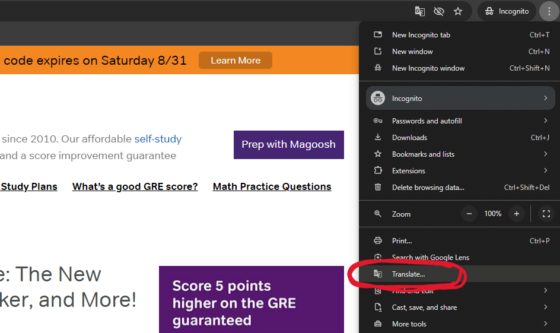
Preparing for the GRE as a non-native English speaker can feel overwhelming, especially when you realize that much of the test hinges on your mastery of the English language. However, with a positive mindset and a structured approach, you can overcome these challenges to achieve your target score. This guide is designed to provide you with general advice on how to tailor your preparation and specific advice on how to modify your Magoosh study schedule.
Click here to skip to how to modify your GRE study schedule as a non-native English speaker.
GRE Tips for Non-Native English Speakers
1. Start Early!
We cannot emphasize strongly enough that it takes a lot of time to realize a significant improvement in Verbal performance. If you are approaching the test as an English language learner or non-native speaker, you’ll likely find that building a robust vocabulary and increasing reading speed and retention is no easy feat. Progress tends to come slowly and in stages. So, if you know that Verbal concepts will pose a challenge for you given lack of comfort or familiarity with standard written English, give yourself adequate study time. The earlier you start building more dedicated Verbal practice into your schedule, the better.
2. Immerse Yourself in English
The most effective way to improve your verbal score is by immersing yourself in English. Regular exposure will help you not only build your vocabulary but also enhance your comprehension. Aim to spend at least 30 minutes a day (in addition to the time you devote to test preparation) reading, listening to, or engaging in English. Does this all need to be GRE-level content? Heck no! Get your feet wet before jumping in. A quick internet search will yield a plethora of free English language resources. You should feel challenged by the content, not overwhelmed. As your familiarity and vocabulary grow, you can continue to level-up the complexity of the content with which you engage.
2a. Podcasts are a Great Multitasking Option
For busy individuals looking to maximize their study time, especially during commutes or other pockets of free(ish) time, podcasts are ideal. High-quality podcasts like The Daily from The New York Times offer rich, GRE-level vocabulary and in-depth discussions. Bonus! You’ll stay informed about current events. In Our Time from the BBC and The Ted Talks Daily Podcast offers similar benefits, with episodes that delve into an incredibly wide-range of subject matter. Your World in Ten Minutes from Reuters and NPR’s Up First also deliver complex, GRE-like topics in a concise format.
3. Train Your Brain
One of the most effective ways to build familiarity with English is to start thinking in English. This means trying to process thoughts, solve problems, and, yes, even dream in English. Training your brain to think in English will help eliminate the need to translate from your native language, a step that can really slow you down come test day.
4. Converse in English
Practice speaking English as much as possible, whether it’s with friends, language exchange partners, or even by talking to yourself. The more you practice, the more comfortable you’ll become with the language. In fact, if you happen to have a GRE study partner or are part of a study group, a great exercise is to discuss the articles you are using to prepare for GRE Reading Comprehension. After you read an article, quiz each other on the main idea and help each other navigate complex sentences and vocabulary.
5. Focus on Contextual Learning
While memorizing vocabulary lists is a common strategy, it’s often more effective to learn words in context. This means reading articles, books, and other materials. Absorbing how words work together to convey meaning will help you understand correct usage. This method will help retain new vocabulary for longer periods, and skillfully navigating context is also very useful for Text Completion and Sentence Equivalence question types.
6. Choose GRE-like Reading Materials
It’s important to read materials that are similar to what you’ll see come test day. Consider such venerated publications as The New York Times, The New Yorker, The Economist, and Arts & Letters Daily. Take a look at our post on reading comprehension practice, which focuses on using some of those publications. Or, if you prefer books, check out our recommended fiction & non-fiction.
7. Read with Intention
- Active Reading: Practice reading actively by summarizing paragraphs, identifying main ideas, and noting key details. To delve deeper into this crucial skill, check out our post dedicated to active reading.
- Annotation: Make notes and highlight key points while reading to improve retention and understanding. Also, if you encounter a complex, confusing sentence, mark it and return to it later so that you can practice breaking it down and putting it in simpler terms.
- Summarization: After reading a passage, write a brief summary in your own words to ensure comprehension.
- Vocabulary Building: Use your most effective method (flashcards often work well) to record any and all words that are new to you. Part of your GRE study should be to review these words often.
8. Other Online Tools & Resources
There are many online tools and resources available that can help you improve your English, especially if you’d classify yourself as a beginner. Consider using language learning apps like Duolingo or Memrise, which offer structured lessons and practice exercises. Additionally, websites like Quizlet can help with vocabulary building through flashcards and games.
Check out this video for GRE vocabulary resources from Magoosh as well as general advice about making the most of your flashcards:
A note about using browser-based translation tools. Use these to support your efforts but remember that there is no translation tool on the GRE, so there is no escaping the need to enhance your English vocabulary if you want to improve your verbal score. We’ve highlighted Google’s translation tool here:

9. Consider Studying for Required Language Proficiency Tests First
For those who will need to submit TOEFL, IELTS, or other language assessment scores when applying to graduate programs, studying for and taking one of the language tests offers several distinct advantages. The TOEFL, for example, is specifically designed to assess your English proficiency, particularly in academic contexts. This aligns closely with the language demands of the GRE. By preparing for language tests, you will strengthen your English reading, writing, listening, and speaking skills and also build a solid foundation for the verbal and analytical writing sections of the GRE. Moreover, the structure of these tests will familiarize you with standardized test formats, making the transition to GRE study smoother and less daunting.
10. Finally, be Persistent and Patient
Learning a new language takes time, and improving your GRE Verbal score as a non-native speaker will require patience and persistence. Set realistic goals, track your progress, and be kind to yourself when you experience a plateau. If you keep at it, you will push through to your goals.
Modifying Your GRE Study Schedule for Non-Native Speakers
We understand that suggesting you read for 30 minutes to one hour each day is no small task. You might be wondering how to find the time, especially if you’re trying to diligently follow each and every item in your Magoosh Study Schedule. But! You don’t have to follow the study schedule to a T. The schedules were designed to be modified to fit an individual’s strengths and weaknesses. If, as a non-native English speaker or someone weaker in verbal, it’s in your best interest to read for an hour (or more) each day as well as have time to record and review any unfamiliar vocabulary, you should feel free to modify the demands of the schedule in whatever way best suits your GRE success.
Let’s say that you are already really strong in Quantitative Reasoning (QR) concepts. At the beginning of each week, look through the QR content to see whether you already know the content of a lesson or just need to lightly review it. If you’re confident you know the concepts, you could either skip those lessons completely or just skim through any for which you only need a refresher. All the time that you don’t need to devote to QR can then be applied to reading and more GRE verbal practice.
Please Note: We recommend that you don’t completely skip any given lesson’s associated practice questions because your performance on those questions will reveal any unexpected weaknesses and lessons that you should, in fact, review more fully.
Advice for Beginners who Cannot Skip any Content
If you find that it’s not in your best interest to skip any of the lessons in your schedule, you still need to do your best to practice reading as much as possible. Unfortunately, the best way to see a significant improvement in your verbal score is to become as comfortable as possible with reading higher-level English texts, and that takes time. Be honest with yourself. If you cannot add time to practice reading each day as well as knock out all the lessons and practice in the schedule, at the bare minimum, can you fit a longer reading session into a sixth or seventh day?
If there’s simply no way you can incorporate the reading you need to do to help you improve your verbal score in your current study schedule, you might need to consider increasing the total amount of time you’ve allocated to studying for the GRE. Many non-native English speakers give themselves up to a year or more to prepare, specifically because of the need to be as comfortable as possible with the English complexity they’ll encounter on the GRE.
Final Thoughts
Preparing for the GRE as a non-native English speaker can be challenging, but with the right approach, you can achieve your goals. Focus on improving your English through immersion, contextual learning, and active practice. Tailor your study schedule to your needs, and remember to stay positive and patient throughout the process. With dedication and effort, you can succeed on the GRE and take the next step toward your academic and career aspirations.
Magoosh has helped thousands of non-native speakers with a range of Verbal concepts, from simply defining words to making sense of an author’s implied arguments on the critical reasoning section — so check out Magoosh GRE today! Try us out for free with a 1-week trial.
Happy studying!





